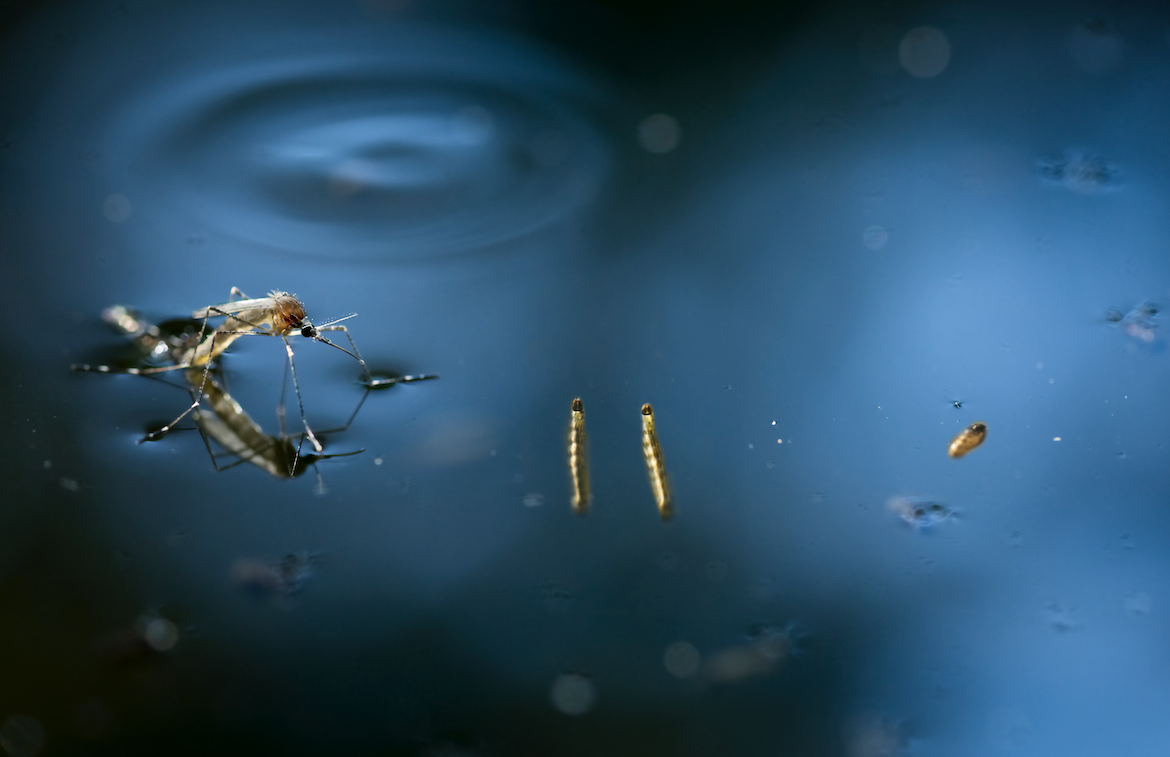According to the California Department of Health, 27 counties so far have detected cases of West Nile. Some of these counties include Contra Costa, Alameda, Santa Clara, San Joquin County, and Sacramento County.
Although West Nile is commonly transmitted to humans through mosquito bites, cases of human infections are rare however the disease can have proved to be fatal for 1 in every 150 infections. Approximately 1 in 5 people who are infected with West Nile will develop symptoms.
To keep your family from West Nile and other diseases that mosquitos may carry, we encourage you to take a few steps to prevent mosquitoes and to keep your family safe.

- Dump or drain standing water throughout your home. Mosquitoes like to lay their eggs in standing water, by taking away this source you can prevent them from establishing themselves in your yard. Examples of these include anything that can accumulate water such as buckets, old tires, and trash lids. By doing this you are taking away the environment that allows mosquitoes to prosper.
- Maintaining your gutters can also be crucial as debris can cause a build-up of water. This is where mosquitoes can lay eggs making clogged gutters a perfect home.
- Replace outdoor lighting. Just like other insects, mosquitoes are attracted to lights. “Bug lights” are special in that they emit wavelengths that are not attractive to insects. By replacing your typical outdoor lighting with “bug lights” fewer mosquitoes should be attracted to your home.
- Use repellents containing DEET, Picaridin, or Oil of Lemon Eucalyptus
- Swimming pools or kiddy pools should be chlorinated and filtered
- Mosquitos are most present during dawn and dusk, so we recommend staying indoors during hours.
Here is some additional info regarding West Nile Virus provided by Contra Costa Health
What is West Nile Virus?
West Nile Virus (WNV) is a disease caused by a virus and spread by mosquitoes. Not all mosquitoes carry West Nile Virus.
What are the symptoms of West Nile Virus?
Most WNV infections result in no symptoms, or mild to moderate illness. If symptoms occur, they may include: fever, headache, body aches, joint pains, vomiting, diarrhea, or rash. More severe cases can cause inflammation of the brain resulting in: headache, high fever, neck stiffness, confusion, coma, tremors, seizures, and paralysis. And, in very rare situations WNV can cause death.
Who is at risk of getting West Nile Virus? Everyone is at risk of getting WNV, particularly:
- People over the age 50 (highest risk of getting severely ill)
- People with outdoor exposure – outdoor work or recreational activities (particularly at dawn and dusk)
- People who are homeless
- People who live in homes which do not have window screens
- People who spend time in heavily wooded areas during the day
- Infants might also be at increased risk
What is the treatment for West Nile Virus?
Treatment for WNV, is based on symptoms the patient is experiencing. In severe cases, hospitalization might be required. There is no vaccine for humans against WNV.
How is West Nile Virus spread?
WNV is passed to people by the bite of an infected mosquito. The mosquito gets infected with the virus after feeding on a bird infected with the WNV. Not all mosquitoes transmit WNV. WNV is NOT passed from person-to-person. The time from infection to onset of disease symptoms (incubation period) ranges from 2 to 15 days.
What can be done to prevent West Nile Virus?
- Protect yourself from mosquito bites by using insect repellent containing one of these ingredients: DEET, Picaridin, Oil of Lemon Eucalyptus, or IR3535 – Use according to manufacturer’s label.
- Wear long-sleeved shirts and long pants when outdoors.
- Limit the amount of time spent outdoors at dawn and dusk, or at other times when mosquitoes are active and particularly during mosquito season, May to October.
- Fix any holes in screens and make sure they are tightly attached to the doors and windows.
- Eliminate standing water from collecting on your property. Mosquitoes can breed in any puddle or standing water that lasts for more than four days.
- Dispose of, turn upside down, or regularly empty any metal cans, plastic containers, ceramic pots, and other water holding containers on your property. Pay special attention to discarded tires, a common place for mosquitoes to breed.
- Do not allow water to stagnate in birdbaths. Change it every three to four days.
- Clean clogged roof gutters of leaves and debris that prevent drainage of rainwater.
- Report neglected (green) swimming pools to Contra Costa Mosquito & Vector Control
- Aerate ornamental ponds or stock them with fish. Free mosquitofish can be obtained by calling Contra Costa Mosquito & Vector Control at 925-685-9301. August 2014
Where can I get tested for West Nile Virus?
People who are not sick and do not have signs or symptoms of WNV are not advised to get tested. People with symptoms such as fever, headache, chills, swollen lymph nodes, rash and fatigue should contact their health care provider who will determine whether testing is needed.
People who do not have health coverage can contact Contra Costa Health Services at 1-800-771-4270 to make an appointment and enroll in health coverage or visit one of the community clinics in their area: http://cchealth.org/centers-clinics/
Can Animals Get West Nile Virus?
Yes. Animals can also become infected with WNV after being bitten by infected mosquitoes; however, most animals do not develop any symptoms. Horses are an important exception: they sometimes develop severe illness with WNV—and since there is no way to predict which horses will or will not develop serious disease if infected, all horses should be vaccinated against WNV.
Pet birds are also susceptible to disease caused by WNV, but owners can protect them from infection by keeping them indoors, particularly at dawn and dusk when mosquitoes are most active.
For more information please contact Contra Costa Public Health at 925-313-6740 and visit our website at http://cchealth.org/westnile/ More information also available here: http://www.cdc.gov/westnile/index.html or http://www.westnile.ca.gov/.
For more information about mosquito prevention and control visit Contra Costa Mosquito & Vector Control (http://www.contracostamosquito.com/) or call 925-771-6196.
